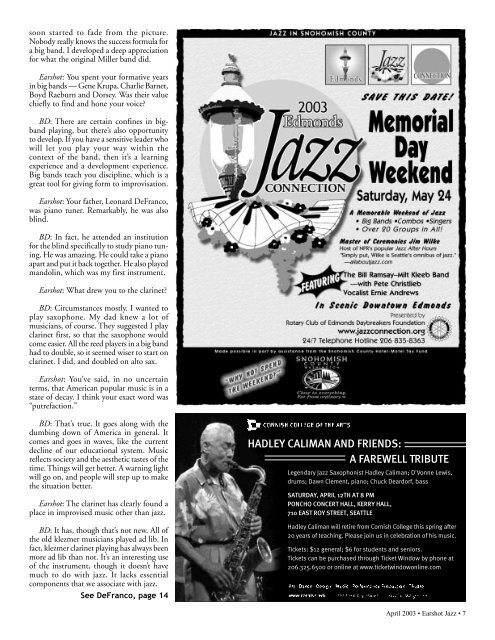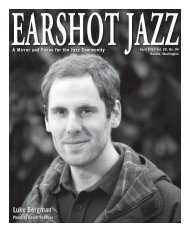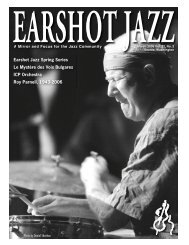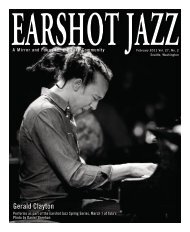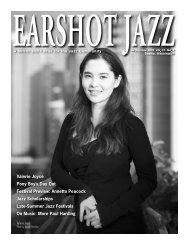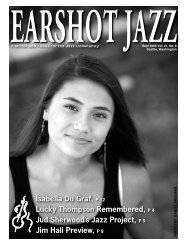Create successful ePaper yourself
Turn your PDF publications into a flip-book with our unique Google optimized e-Paper software.
soon started to fade from the picture.<br />
Nobody really knows the success formula for<br />
a big band. I developed a deep appreciation<br />
for what the original Miller band did.<br />
<strong>Earshot</strong>: You spent your formative years<br />
in big bands — Gene Krupa, Charlie Barnet,<br />
Boyd Raeburn and Dorsey. Was their value<br />
chiefly to find and hone your voice?<br />
BD: There are certain confines in bigband<br />
playing, but there’s also opportunity<br />
to develop. If you have a sensitive leader who<br />
will let you play your way within the<br />
context of the band, then it’s a learning<br />
experience and a development experience.<br />
Big bands teach you discipline, which is a<br />
great tool for giving form to improvisation.<br />
<strong>Earshot</strong>: Your father, Leonard DeFranco,<br />
was piano tuner. Remarkably, he was also<br />
blind.<br />
BD: In fact, he attended an institution<br />
for the blind specifically to study piano tuning.<br />
He was amazing. He could take a piano<br />
apart and put it back together. He also played<br />
mandolin, which was my first instrument.<br />
<strong>Earshot</strong>: What drew you to the clarinet?<br />
BD: Circumstances mostly. I wanted to<br />
play saxophone. My dad knew a lot of<br />
musicians, of course. They suggested I play<br />
clarinet first, so that the saxophone would<br />
come easier. All the reed players in a big band<br />
had to double, so it seemed wiser to start on<br />
clarinet. I did, and doubled on alto sax.<br />
<strong>Earshot</strong>: You’ve said, in no uncertain<br />
terms, that American popular music is in a<br />
state of decay. I think your exact word was<br />
“putrefaction.”<br />
BD: That’s true. It goes along with the<br />
dumbing down of America in general. It<br />
comes and goes in waves, like the current<br />
decline of our educational system. Music<br />
reflects society and the aesthetic tastes of the<br />
time. Things will get better. A warning light<br />
will go on, and people will step up to make<br />
the situation better.<br />
<strong>Earshot</strong>: The clarinet has clearly found a<br />
place in improvised music other than jazz.<br />
BD: It has, though that’s not new. All of<br />
the old klezmer musicians played ad lib. In<br />
fact, klezmer clarinet playing has always been<br />
more ad lib than not. It’s an interesting use<br />
of the instrument, though it doesn’t have<br />
much to do with jazz. It lacks essential<br />
components that we associate with jazz.<br />
See DeFranco, page 14<br />
HADLEY CALIMAN AND FRIENDS:<br />
A FAREWELL TRIBUTE<br />
Legendary <strong>Jazz</strong> Saxophonist Hadley Caliman; D'Vonne Lewis,<br />
drums; Dawn Clement, piano; Chuck Deardorf, bass<br />
SATURDAY, APRIL 12TH AT 8 PM<br />
PONCHO CONCERT HALL, KERRY HALL,<br />
710 EAST ROY STREET, SEATTLE<br />
Hadley Caliman will retire from Cornish College this spring after<br />
20 years of teaching. Please join us in celebration of his music.<br />
Tickets: $12 general; $6 for students and seniors.<br />
Tickets can be purchased through Ticket Window by phone at<br />
206.325.6500 or online at www.ticketwindowonline.com<br />
<strong>April</strong> <strong>2003</strong> • <strong>Earshot</strong> <strong>Jazz</strong> • 7


